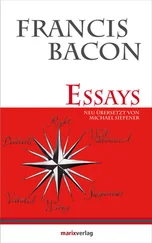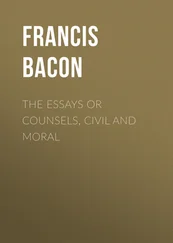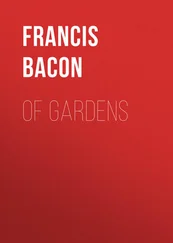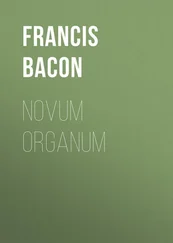Francis Bacon - The Essays
Здесь есть возможность читать онлайн «Francis Bacon - The Essays» — ознакомительный отрывок электронной книги совершенно бесплатно, а после прочтения отрывка купить полную версию. В некоторых случаях можно слушать аудио, скачать через торрент в формате fb2 и присутствует краткое содержание. Год выпуска: 0101, Жанр: foreign_antique, foreign_prose, на английском языке. Описание произведения, (предисловие) а так же отзывы посетителей доступны на портале библиотеки ЛибКат.
- Название:The Essays
- Автор:
- Жанр:
- Год:0101
- ISBN:нет данных
- Рейтинг книги:5 / 5. Голосов: 1
-
Избранное:Добавить в избранное
- Отзывы:
-
Ваша оценка:
- 100
- 1
- 2
- 3
- 4
- 5
The Essays: краткое содержание, описание и аннотация
Предлагаем к чтению аннотацию, описание, краткое содержание или предисловие (зависит от того, что написал сам автор книги «The Essays»). Если вы не нашли необходимую информацию о книге — напишите в комментариях, мы постараемся отыскать её.
The Essays — читать онлайн ознакомительный отрывок
Ниже представлен текст книги, разбитый по страницам. Система сохранения места последней прочитанной страницы, позволяет с удобством читать онлайн бесплатно книгу «The Essays», без необходимости каждый раз заново искать на чём Вы остановились. Поставьте закладку, и сможете в любой момент перейти на страницу, на которой закончили чтение.
Интервал:
Закладка:
Of Death
Men fear death, as children fear to go in the dark; and as that natural fear in children, is increased with tales, so is the other. Certainly, the contemplation of death, as the wages of sin, and passage to another world, is holy and religious; but the fear of it, as a tribute due unto nature, is weak. Yet in religious meditations, there is sometimes mixture of vanity, and of superstition. You shall read, in some of the friars' books of mortification, that a man should think with himself, what the pain is, if he have but his finger's end pressed, or tortured, and thereby imagine, what the pains of death are, when the whole body is corrupted, and dissolved; when many times death passeth, with less pain than the torture of a limb; for the most vital parts, are not the quickest of sense. And by him that spake only as a philosopher, and natural man, it was well said, Pompa mortis magis terret, quam mors ipsa. Groans, and convulsions, and a discolored face, and friends weeping, and blacks, and obsequies, and the like, show death terrible. It is worthy the observing, that there is no passion in the mind of man, so weak, but it mates, and masters, the fear of death; and therefore, death is no such terrible enemy, when a man hath so many attendants about him, that can win the combat of him. Revenge triumphs over death; love slights it; honor aspireth to it; grief flieth to it; fear preoccupateth it; nay, we read, after Otho the emperor had slain himself, pity (which is the tenderest of affections) provoked many to die, out of mere compassion to their sovereign, and as the truest sort of followers. Nay, Seneca adds niceness and satiety: Cogita quamdiu eadem feceris; mori velle, non tantum fortis aut miser, sed etiam fastidiosus potest. A man would die, though he were neither valiant, nor miserable, only upon a weariness to do the same thing so oft, over and over. It is no less worthy, to observe, how little alteration in good spirits, the approaches of death make; for they appear to be the same men, till the last instant. Augustus Caesar died in a compliment; Livia, conjugii nostri memor, vive et vale. Tiberius in dissimulation; as Tacitus saith of him, Jam Tiberium vires et corpus, non dissimulatio, deserebant. Vespasian in a jest, sitting upon the stool; Ut puto deus fio. Galba with a sentence; Feri, si ex re sit populi Romani; holding forth his neck. Septimius Severus in despatch; Adeste si quid mihi restat agendum. And the like. Certainly the Stoics bestowed too much cost upon death, and by their great preparations, made it appear more fearful. Better saith he, qui finem vitae extremum inter munera ponat naturae. It is as natural to die, as to be born; and to a little infant, perhaps, the one is as painful, as the other. He that dies in an earnest pursuit, is like one that is wounded in hot blood; who, for the time, scarce feels the hurt; and therefore a mind fixed, and bent upon somewhat that is good, doth avert the dolors of death. But, above all, believe it, the sweetest canticle is', Nunc dimittis; when a man hath obtained worthy ends, and expectations. Death hath this also; that it openeth the gate to good fame, and extinguisheth envy.—Extinctus amabitur idem.
Of Deformity
Deformed persons are commonly even with nature; for as nature hath done ill by them, so do they by nature; being for the most part (as the Scripture saith) void of natural affection; and so they have their revenge of nature. Certainly there is a consent, between the body and the mind; and where nature erreth in the one, she ventureth in the other. Ubi peccat in uno, periclitatur in altero. But because there is, in man, an election touching the frame of his mind, and a necessity in the frame of his body, the stars of natural inclination are sometimes obscured, by the sun of discipline and virtue. Therefore it is good to consider of deformity, not as a sign, which is more deceivable; but as a cause, which seldom faileth of the effect. Whosoever hath anything fixed in his person, that doth induce contempt, hath also a perpetual spur in himself, to rescue and deliver himself from scorn. Therefore all deformed persons, are extreme bold. First, as in their own defence, as being exposed to scorn; but in process of time, by a general habit. Also it stirreth in them industry, and especially of this kind, to watch and observe the weakness of others, that they may have somewhat to repay. Again, in their superiors, it quencheth jealousy towards them, as persons that they think they may, at pleasure, despise: and it layeth their competitors and emulators asleep; as never believing they should be in possibility of advancement, till they see them in possession. So that upon the matter, in a great wit, deformity is an advantage to rising. Kings in ancient times (and at this present in some countries) were wont to put great trust in eunuchs; because they that are envious towards all are more obnoxious and officious, towards one. But yet their trust towards them, hath rather been as to good spials, and good whisperers, than good magistrates and officers. And much like is the reason of deformed persons. Still the ground is, they will, if they be of spirit, seek to free themselves from scorn; which must be either by virtue or malice; and therefore let it not be marvelled, if sometimes they prove excellent persons; as was Agesilaus, Zanger the son of Solyman, AEsop, Gasca, President of Peru; and Socrates may go likewise amongst them; with others.
Of Delays
Fortune is like the market; where many times if you can stay a little, the price will fall. Again, it is sometimes like Sibylla's offer; which at first, offereth the commodity at full, then consumeth part and part, and still holdeth up the price. For occasion (as it is in the common verse) turneth a bald noddle, after she hath presented her locks in front, and no hold taken; or at least turneth the handle of the bottle, first to be received, and after the belly, which is hard to clasp. There is surely no greater wisdom, than well to time the beginnings, and onsets, of things. Dangers are no more light, if they once seem light; and more dangers have deceived men, than forced them. Nay, it were better, to meet some dangers half way, though they come nothing near, than to keep too long a watch upon their approaches; for if a man watch too long, it is odds he will fall asleep. On the other side, to be deceived with too long shadows (as some have been, when the moon was low, and shone on their enemies' back), and so to shoot off before the time; or to teach dangers to come on, by over early buckling towards them; is another extreme. The ripeness, or unripeness, of the occasion (as we said) must ever be well weighed; and generally it is good, to commit the beginnings of all great actions to Argus, with his hundred eyes, and the ends to Briareus, with his hundred hands; first to watch, and then to speed. For the helmet of Pluto, which maketh the politic man go invisible, is secrecy in the counsel, and celerity in the execution. For when things are once come to the execution, there is no secrecy, comparable to celerity; like the motion of a bullet in the air, which flieth so swift, as it outruns the eye.
Of Discourse
Some, in their discourse, desire rather commendation of wit, in being able to hold all arguments, than of judgment, in discerning what is true; as if it were a praise, to know what might be said, and not, what should be thought. Some have certain common places, and themes, wherein they are good and want variety; which kind of poverty is for the most part tedious, and when it is once perceived, ridiculous. The honorablest part of talk, is to give the occasion; and again to moderate, and pass to somewhat else; for then a man leads the dance. It is good, in discourse and speech of conversation, to vary and intermingle speech of the present occasion, with arguments, tales with reasons, asking of questions, with telling of opinions, and jest with earnest: for it is a dull thing to tire, and, as we say now, to jade, any thing too far. As for jest, there be certain things, which ought to be privileged from it; namely, religion, matters of state, great persons, any man's present business of importance, and any case that deserveth pity. Yet there be some, that think their wits have been asleep, except they dart out somewhat that is piquant, and to the quick. That is a vein which would be bridled:
Читать дальшеИнтервал:
Закладка:
Похожие книги на «The Essays»
Представляем Вашему вниманию похожие книги на «The Essays» списком для выбора. Мы отобрали схожую по названию и смыслу литературу в надежде предоставить читателям больше вариантов отыскать новые, интересные, ещё непрочитанные произведения.
Обсуждение, отзывы о книге «The Essays» и просто собственные мнения читателей. Оставьте ваши комментарии, напишите, что Вы думаете о произведении, его смысле или главных героях. Укажите что конкретно понравилось, а что нет, и почему Вы так считаете.












